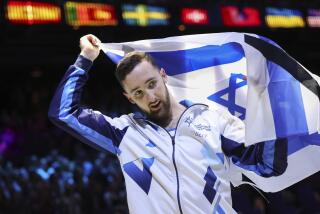American Jews suit up for Team Israel in baseball
PETAH TIQWA, Israel -- The finest baseball field in Israel is here, with a tree beyond center field whose branches and leaves lean over the outfield wall, with rickety wooden bleachers atop a mix of dirt, pebbles and weeds.
The field is part of a conference center and recreational facility established by Americans. The second-best field in the country is part of a village founded by Americans. The Israel Baseball League, a professional league dreamed up and poorly implemented by Americans, collapsed after one season.
Now comes the World Baseball Classic, in which a couple of dozen American Jews will throw on blue jerseys and call themselves Team Israel.
The Israelis live full and happy sporting lives without embracing America’s national pastime. But after decades of indifference, that embrace could be one game away.
If Team Israel wins.
“This could be the most celebrated Israeli team since David met Goliath,” said Haim Katz, president of the Israel Assn. of Baseball, or IAB.
The odds would have been about the same too, had Team Israel limited its roster to Israelis.
It didn’t. Brad Ausmus is the manager, Shawn Green and Gabe Kapler have come out of retirement to play and Ryan Braun and Ian Kinsler might have to decide whether to spurn Team USA for Team Israel.
“That would be a difficult decision to make, seriously,” Braun said.
Israel first must win a qualifying tournament in September, when major leaguers will not be available. The 50-man pool for Israel’s qualifying roster is stocked with minor leaguers. Jake Lemmerman of Corona del Mar, who plays for the Dodgers’ double-A Chattanooga affiliate, could start at shortstop. The pool also includes Casey Haerther of Chatsworth, a first baseman for the Angels’ double-A Arkansas farm team, and Joc Pederson, an outfielder for the Dodgers’ Class-A Rancho Cucamonga club.
If Israel fails to survive the qualifying round — in a field with France, Spain and South Africa — then baseball will return to the shadows of the Israeli sporting scene. If Israel wins the championship game of the qualifier, then come the major leaguers for the headline event in March.
Ausmus got an audience with Israeli President Shimon Peres just for agreeing to manage the team. The country might shut down for a day if Braun showed up, threw out a few words in Hebrew and donned a Team Israel jersey.
“I think the Israeli story will be one of the great stories of the WBC,” Major League Baseball Commissioner Bud Selig said.
If baseball is to capture the Israeli imagination, it might be now or never. If Israel wins that one game — the championship game of that qualifying tournament — then the national sporting conversation might turn to the tantalizing prospect of Derek Jeter batting against the Jewish homeland.
And, if attention translates into money, the WBC could jump-start baseball in Israel. The IAB desperately needs a training complex with first-class fields to attract quality athletes and international tournaments. The land has been donated — if the IAB can raise $4 million for construction, and soon.
“If we don’t have the WBC, there would be no way we could raise it,” said Peter Kurz, secretary-general of the IAB.
That the advancement of Israeli baseball has been outsourced to American minor leaguers has not gone unnoticed, though there is nothing improper about the arrangement. Under Israeli law, anyone with at least one Jewish grandparent is eligible for citizenship.
Of the 50 spots on the qualifying roster, four belong to Israelis. There is no guarantee any of them will play an inning.
“It’s a bittersweet feeling,” infielder Asaf Rothem said. “I’d like to see all Israelis there. On the other hand, I’d be happy for Team Israel to qualify. I think it would be huge.”
Cypress College pitcher Alon Leichman, considered the premier pitcher on the Israeli national team, has a fastball in the mid-80s. Jeter might like facing Leichman.
“His stuff is probably a little short of getting guys out,” Cypress Coach Scott Pickler said, “but he wouldn’t be afraid.”
Said Leichman: “Yeah, I started thinking about that — just get through the qualifying round and hope for the best against the big boys. I can’t wait for that.
“If I get to pitch against Jeter, I’d be a happy man. He’s my idol.”
The national team will travel to Florida for training camp, practicing alongside the minor leaguers, picking up knowledge to pass along to the next generation of Israeli ballplayers. In return, the native players will share Israeli life with the minor leaguers who might represent the Jewish state without having set foot there.
“You could have guys mumble and stumble when they’re asked about Israel,” pitcher Dan Rothem said, “or they could say they’re excited about Israel. That’s the task at hand.”
Baseball in Israel is almost invisible, with soccer and basketball the dominant sports. In a country of 8 million, about 1,000 play baseball.
Kurz has big dreams. He wants Israel to produce its first major leaguer in 10 to 15 years. It all starts with a field to make the country proud, with donations inspired by the WBC.
Asaf Rothem has heard predictions that baseball will be Israel’s next big sporting passion “at least 10 times” during his career with the national team.
With the WBC, and the field that might come with it, maybe those predictions finally will come true. Rothem all but groaned as he said so.
“There is a movie that says, ‘If you build it, they will come,’ ” he said.
twitter.com/BillShaikin
More to Read
Go beyond the scoreboard
Get the latest on L.A.'s teams in the daily Sports Report newsletter.
You may occasionally receive promotional content from the Los Angeles Times.











